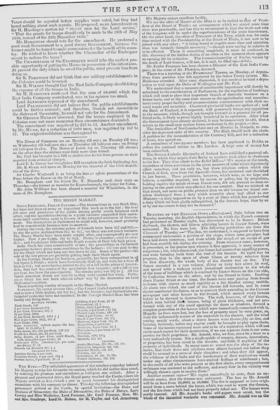TITE Krarc.—The delightful appearance of the weather yesterday induced his
Majesty to take his favourite recreation, which he did earlier than usual, by ordering his phaeton and attendants at half-past one o'clock. After a pleasant and protracted drive, the Royal party reached the Castle,where his :Majesty arrived at five o'clock ; and at seven honoured his distinguished attendants with his company to dinner. This day the following distinguished personages arrived at the Castle, by special invitation—the Duke and Duchess of Gloucester, the Duke of Devonshire, the Duke of Disrset, Lady Cowley and Miss Wellesley, Lord Forester, Mr. Cecil Forester, Hon. Mr. and Mrs. Stanhope, Lord St. Helens, Sir H. Taylor, and Col, Armstrong.
His Majesty enjoys excellent health.
We see the office of Master of the Mint is to be united to that of Presi- dent of the 'Board of Trade ; an arrangement which we stated some time
since was practicable, and has this to recommend it, that the trade and coin of the kingdom will be under the superintendence of the same functionary. On the other hand, the office of Treasurer of the Navy, which was for some
time united with the Presidentship of the Board of Trade, is not now to be
joined with any other ; " it being found to require more time and attention than was formerly thought necessary,"—though some saving in salaries is
to be effected. There is something suspicions, it must be confessed, in this discovery of the hidden duties of an office at the moment there appears an opening for its reduction. The Commissionership of Excise, vacant by the death of Lord Graves, will not, is is said, be filled up.—Globe.
Mr. Cutler Ferguson has been chosen a Director of the East India Come pansy, in the room of Mr. Plowden, deceased.
There was a meeting at the Freemasons' Tavern on Monday, of deputa- tions from parishes who felt aggrieved by the Select Vestry system. Mrs Hobhouse attended. After some discussion, it was resolved to send a depu- tation to wait upon the Duke of Wellington and Mr. Peel. We understand that a measure of considerable importance will shortly be submitted to the consideration of Parliament, for the regulation of banking; which will tend to place that important branch of domestic business on a firmer basis, and at the same time ensure to the agriculturist and manufac- turer every proper facility and accommodations commensurate with their se- veral wants and securities. Chartered provincial banks are spoken of; and the Bank of England, it is expected, will generously forego any opposition' to the measure which, though not brought forward as a panacea for all po- litical evils, is likely to prove highly beneficial in its operation. After what the Government have already declared, it may be unnecessary to add, that a return to the small note system forms no feature in the project.—Sun.
The freeholders of Northumberland met on Monday in Morpeth, to con- sider the depressed state of the country. The High Sheriff took the chair. A petition for the reconsideration of the Currency Bill, and for a reduction of taxes, was agreed on.
A committee of twenty-one members has been appointed in Dublin to collect the national tribute to Mr. Lawless. A large sum of money has been subscribed.
The Roman Catholic Hierarchy of Ireland have published a pastoral ad. dress, ins which they enjoin their flocks to emulate each other in obedience to the law. They tints allude to the Relief Bill:—" We rejoice at the result, regardless of those provisions in the great measure of relief which injuriously affect ourselves, and not only us, but those religious orders which the Church of God, even from the Apostolic times, has nurtured and cherished in her bosom. These provisions, however, which were, ins we hope and believe, a sacrifice required, not by reason or policy, but by prejudices, holding captive the minds of even honest men, did not prevent us from re- joicing at the good which was effected fur our country. But we rejoiced at that result, not more on public grounds than we did because we found our- selves discharged from a duty which necessity alone had allied to our Ministry—a duty imposed on us by a state of times which has passed—but a duty which we have gladly relinquished, in the fervent hope, that by US or by our successors it may not be resumed."


















 Previous page
Previous page